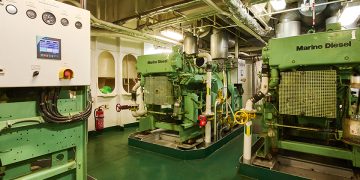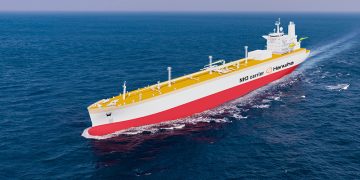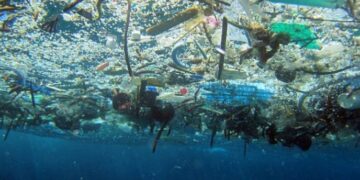The next decades will be immensely critical in resolving the climate change phenomenon. The impact from the transportation industry plays a significant role and its members should ensure that the environment will not be harmed, at least not any further, highlights Dr. Konstantinos Galanis, Chairman of the International Ship Recycling Association (ISRA).
As the majority of cargoes and services are transported via the seaborne trade and the demand is continuously increasing, there is an immediate need to optimize our sustainability and the environmental footprint of vessels. Shipping is not the top polluter but responsible industries do not need to “thrive” on this before they act.
The final part of a vessel’s life cycle, ship recycling, materializes as a result of a vessel reaching the end of its commercial life or due to structural/operational issues and the demand from steel mills. The regulatory framework for safe and environmentally sound ship recycling has already been developed several years ago and improvements are in progress nationally, regionally and internationally. The European Commission (EC) is leading this mandate while International Maritime Organization (IMO) is struggling to enforce the relevant requirements so as to integrate this sector.
Of particular importance is shipowners to develop and implement a ship recycling strategy while ship recycling facilities must adapt shipping management practices and knowledge to align their functions with the maritime industry. Key factors on this perspective, are the compliance to the Environmental, Social and Governance (ESG) strategies and requirements initially set from other industries as well as to follow the EU Taxonomy guidelines. ESG directions should be embedded in companies’ systems to create a robust and transparent methodology for navigating the harsh environments of the future, both ashore and at sea.
EU Taxonomy is a classification system, establishing a list of environmentally sustainable economic activities to:
- Assist EU to scale up sustainable investment and implement the European Green Deal to transform the EU into a modern, resource-efficient and competitive economy, ensuring (i) no net emissions of greenhouse gases by 2050, (ii) economic growth decoupled from resource use, and (iii) no person and no place left behind;
- Provide companies, investors and policymakers with appropriate definitions for which economic activities can be considered environmentally sustainable;
- Create security for investors from greenwashing;
- Help companies to become more climate-friendly, mitigate market fragmentation and help shift investments where they are most needed.
The Taxonomy Regulation was published in the Official Journal of the European Union on 22 June 2020 and entered into force on 12 July 2020 creating a useful tool for addressing sustainability that can also be followed by the ship recycling facilities. It establishes the basis for the EU taxonomy by setting out 4 overarching conditions that an economic activity has to meet in order to qualify as being environmentally sustainable:
(1) must substantially contribute to one or more of the environmental objectives;
(2) do no significant harm (DNSH) to any of the other environmental objectives;
(3) be carried out in compliance with minimum social and governance safeguards; and
(4) comply with technical screening criteria, which the Climate Delegated Act sets out in relation to climate change mitigation and climate change adaptation.
The Taxonomy Regulation establishes the environmental objectives of climate change mitigation, climate change adaptation, the sustainable use and protection of water and marine resources, the transition to a circular economy and pollution prevention and control. The protection and restoration of biodiversity and ecosystems is a challenge that the ship recycling facilities have to tackle while co-operating with the ship owner who prepares the vessel for recycling.
All the above have become significantly easier to adopt since the post Covid-19 era has accelerated technological schemes that the maritime industry is using. Digitizing vessels prior to reaching their end-of-life status can improve this sector. Therefore, ship owners shall proceed by:
- Integrating into the in-house management systems, can demonstrate the commitment to safe and environmentally sound practices at the end of ship’s life,
- Supporting better hazard management and more environmentally sound recycling of ships,
- Maintaining onboard safety and the wellbeing of the seafarers,
- Contributing to a safe workplace for your employees,
- Minimising operational impact, risks and potential liabilities,
- Enhancing reputation both within the industry and with the wider public,
- Avoiding potential detentions, delays and penalties at portside control, and
- Ensuring higher resale values for ships.
Carbon dioxide emissions from steel production equate to about 8 per cent of the total global carbon dioxide emissions. Recycled steel can assist to stop waste being produced in the first place. Fossil fuels should be diminished from the manufacturing of steel and low-energy sources (for example hydrogen, electricity, coal gasification, etc.) should be utilized.
To formulate and implement the aforementioned, ship owners and ship recycling facilities have to:
- improve their cultural adaptability
- maintain compliance
- abide by highest standards & assessments
- provide a safe environment for their workers
- protect the environment,
- maintain and execute a proper IHM that includes information for Naturally Occurring Radioactive Materials (NORM) and Mercury, wherever applicable, and
- cooperate only with licensed waste disposal facilities that meet the highest requirements.
The views presented hereabove are only those of the author and do not necessarily reflect those of SAFETY4SEA and are for information sharing and discussion purposes only.






























































